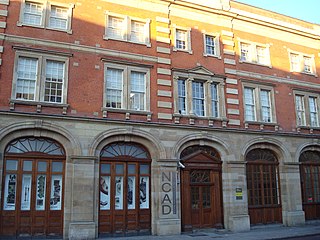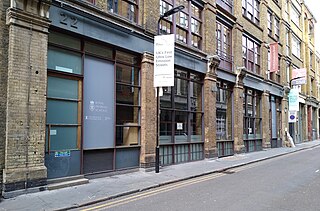This article needs additional citations for verification .(August 2013) |
A foundation course is a preparatory course for university-level art and design education, used particularly in the United Kingdom.
This article needs additional citations for verification .(August 2013) |
A foundation course is a preparatory course for university-level art and design education, used particularly in the United Kingdom.
A foundation course is a one or two-year preparatory course for school-leavers who want to qualify for a place on a bachelor's degree course in art, design or architecture. The course is almost entirely practical in nature, although increasingly elements of art and design history have been introduced, and it is considered sufficient to qualify those who pass it to move on to a degree course without further study. It is the dominant form of entry to university and art college degree courses in the United Kingdom, but versions of it exist in several other countries, particularly where British influence over art education has been historically strong. In Ireland it is known as the Core Studies course, and versions of the foundation course also exist in Australia, Canada, Cyprus, Malta, Malaysia and New Zealand.
Harry Thubron at Leeds College of Art.[ clarification needed ] Together they[ who? ] began to establish a team to deliver a new form of art preparation course they called the Basic Design Course. The aim of the course was to teach what were considered to be the basic skills that underpin all art and design activities, including architecture. This resulted in projects designed to develop skills in using colour, articulating two- and three-dimensional space, defining form and experimenting with diverse materials. Many of these theories were tested by Thubron at a series of art summer schools in the seaside town of Scarborough, North Yorkshire, which attracted art students, artists and art teachers from throughout Britain. The result of this was that the theories of the basic design course were very widely disseminated, which helped the programme to become so widespread.
This approach to preparing art and design students for degree level study had its origins in the writings of Herbert Read, and Coldstream, Thubron and Read regularly met to discuss their ideas at Read's house in the village of Stonegrave, North Yorkshire. Read's ideas had their origin in the German Bauhaus school of art, which had used a similar method prior to its closure by the Nazis in 1933.
A notable feature of this method of the foundation course method is that it does not teach basic versions of later art or design practices, so that someone wanting to be a painter would not be taught basic painting, or a student wanting to be a graphic designer would not be taught basic graphic design. Specific skills were left to be taught in the specific degree course itself, whereas the foundation course only focused on the core skills that are perceived to be common to all art and design practices.
Outside of the United Kingdom, most Foundation Course programmes are validated by universities or national education authorities, although the programmes in Malta and Cyprus are validated by the United Kingdom examining boards.
The University of Brighton is a public university based on four campuses in Brighton and Eastbourne on the south coast of England. Its roots can be traced back to 1858 when the Brighton School of Art was opened in the Royal Pavilion. It achieved university status in 1992.
A Bachelor of Commerce is an undergraduate degree in business, usually awarded in Canada, Australia, India, Sri Lanka, Pakistan, Ireland, New Zealand, Ghana, South Africa, Myanmar, Egypt, and additional Commonwealth countries. The degree was previously offered in the United Kingdom.
Education in England is overseen by the United Kingdom's Department for Education. Local government authorities are responsible for implementing policy for public education and state-funded schools at a local level.
A graduate diploma is generally a qualification taken after completion of a first degree, although the level of study varies in different countries from being at the same level as the final year of a bachelor's degree to being at a level between a master's degree and a doctorate. In some countries the graduate diploma and postgraduate diploma are synonymous, while in others the postgraduate diploma is a higher qualification.
The Cyprus College of Art (CyCA) is an artists' studio group, located in the village of Lempa on the west coast of Cyprus. It was founded in 1969 by the artist Stass Paraskos; the current director is the Cyprus-based artist Margaret Paraskos.

Third-level education in the Republic of Ireland includes all education after second-level, encompassing higher education in universities and colleges and further education on Post Leaving Certificate (PLC) and other courses. The degree-awarding institutions which can grant awards at all academic levels are the University of Dublin, National University of Ireland, University of Limerick, Dublin City University, Technological University Dublin, the Royal College of Surgeons in Ireland, Munster Technological University and Technological University of the Shannon: Midlands Midwest, as well as St. Patrick's College, Maynooth, and then a State agency, Quality and Qualifications Ireland, can grant awards in other institutions directly, or delegate the authority to do so. and University of Limerick. The King's Inns of Dublin has a limited role in education specialising in the preparation of candidates for the degree of barrister-at-law to practice as barristers. Medical schools in Ireland also have particular regulation. There were seven establishments of higher education within Ireland ranked among the top 500 universities worldwide by the Times Higher Education Supplement in 2008.

Norwich University of the Arts (NUA) is a public university in Norwich, Norfolk, United Kingdom that specialises in art, design and media. It was founded as Norwich School of Design in 1845 and has a long history of arts education. It gained full university status in 2013.

Arts University Plymouth is an independent university-sector Higher Education (HE) provider located in Plymouth in South West England. The former Plymouth College of Art was officially granted university status in 2022. In April 2019 the specialist college was awarded taught degree awarding powers (TDAP) by the Quality Assurance Agency for Higher Education (QAA), granting the institution the authority to award and accredit its own BA (Hons) degrees and Masters awards.
The Open College of the Arts (OCA) is an open learning arts college, with a Head Office in Barnsley in South Yorkshire, England. Founded in 1987 by Michael Young, it is a registered charity and the distance learning partner of the University for the Creative Arts (UCA). As of the 2016/17 academic year, the full cost of a part-time degree with the Open College of the Arts is less than £10,000.

Ravensbourne University London is a digital media and design university, with vocational courses in fashion, television and broadcasting, interactive product design, architecture and environment design, graphic design, animation, moving image, music production for media and sound design.

The National College of Art and Design (NCAD) is Ireland's oldest art institution, offering the largest range of art and design degrees at undergraduate and postgraduate level in the country. Originating as a drawing school in 1746, many of the most important Irish artists, designers and art educators have studied or taught in the college. NCAD has always been located in central Dublin, and in 1980 it relocated to the historic Liberties area. The College has around 950 full-time students and a further 600 pursuing part-time courses, and NCAD's students come from more than forty countries. NCAD is a Recognised College of University College Dublin. It is also a member of the European League of Institutes of the Arts.

Falmouth University is a specialist public university for the creative industries based in Falmouth and Penryn, Cornwall, England. Founded as Falmouth School of Art in 1902, it was later known as Falmouth College of Art and Design and then Falmouth College of Arts until 2012, when the university college was officially granted full university status by the Privy Council.
A Master of Research degree is an internationally recognised advanced postgraduate research degree. In most cases, the degree is designed to prepare students for doctoral research. Increasingly, the degree may be useful for students considering careers outside of academia, where high-level research skills are valued but a doctoral qualification is not required.

The Animation Workshop is an animation school housed in the former military barracks in Viborg, Denmark. It is a part of VIA University College's School of Business, Technology and Creative Industries. Since the late 1980s, The Animation Workshop has educated and trained animators for the Danish as well as the international animation, computer game and visual effects industry. The Animation Workshop has a strong international network of artists, professionals, companies, funding institutions and partner schools. Teachers and students come from Denmark and the rest of the world, and all classes are conducted in English.
Harry Thubron OBE was an English artist and art teacher. He made radical innovations in art education which are still controversial today.
The One Academy of Communication Design is a private arts and design institute headquartered in Bandar Sunway, Selangor, with a northern campus in George Town, Penang.

The Prince's Foundation School of Traditional Arts is a school in London which teaches students at the postgraduate degree level, and short open courses and in the community. The school was founded in 2005 by King Charles III as part of The Prince's Charities group, with the aim "to continue the living traditions of the world's sacred and traditional art forms".
In the UK education sector, there are a wide range of qualification types offered by the United Kingdom awarding bodies. Qualifications range in size and type, can be academic, vocational or skills-related, and are grouped together into different levels of difficulty. In England, Wales and Northern Ireland, qualifications are divided into Higher Education qualifications, which are on the Framework for Higher Education Qualifications (FHEQ) and are awarded by bodies with degree awarding powers, and Regulated qualifications, which are on the Regulated Qualifications Framework (RQF) and are accredited by Ofqual in England, the Council for the Curriculum, Examinations and Assessment in Northern Ireland and Qualifications Wales in Wales. In Scotland, qualifications are divided into Higher Education qualifications, Scottish Qualifications Authority qualifications and Scottish Vocational Qualifications/Modern Apprenticeships, which are on the Scottish Credit and Qualifications Framework (SCQF). Scottish Higher Education Qualifications are on both the SCQF and the FHEQ.
Tom Hudson was a British artist and lecturer. He created sculptures using modern materials such as perspex and resin and considered that Art could be a means of changing society. His greatest influence was on Art teaching. He was a foremost proponent of the Bauhaus concept of teaching Art and Design by Basic Design, taking that principle to Art Colleges across the UK in the 1950s, 60s and 70s. This came to be the Art foundation course which provide an holistic grounding for Art and Design students before taking higher education qualifications.

TEAM University is an entrepreneurial university in Tashkent, Uzbekistan. Founded in April 2020 by the decree of the Cabinet of Ministers number 241 from 18 April 2020 and granted a license by the State Inspection for Supervision of Quality in Education with number 0007. The university is the first entrepreneurial university in Uzbekistan and it is founded as a private, non-state owned institution.